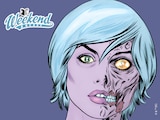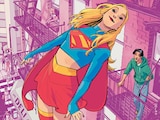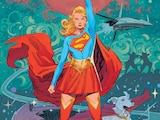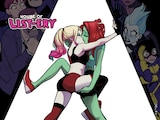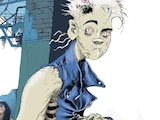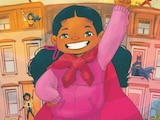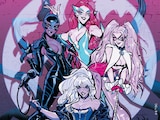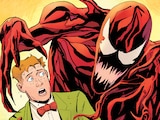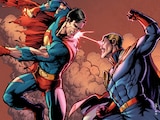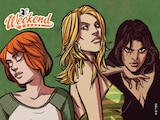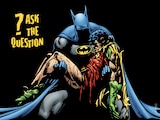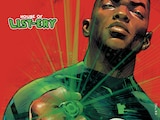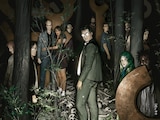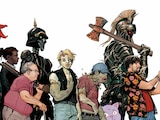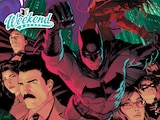If you’ve seen Zack Snyder’s Justice League, you know everything about it is big. Deep dives into the characters’ histories, longer and more intense action sequences, a greatly expanded narrative—it’s the very definition of a superhero epic. A giant, high-energy movie like Snyder’s new cut of his 2017 film needs an equally massive and imaginative score—one that would establish themes that could be built on for subsequent solo films. Even more challenging, that score would need be recorded quickly and under unprecedented circumstances and would require about twice the amount of music as a regular film. Finally, the whole thing would happen under the figurative eye of millions of rabid fans who have been clamoring for this movie to be released for four years.
Enter Tom Holkenborg.
Zack Snyder’s Justice League isn’t Holkenborg’s first go at scoring a DC blockbuster. He contributed music to Snyder’s previous film, Batman v Superman: Dawn of Justice, under his electronic music moniker Junkie XL with Hans Zimmer. However, Zack Snyder’s Justice League is the first time Holkenborg’s gone solo on a DC project and he certainly didn’t start small. With a runtime of over four hours and a cast that includes six of DC’s most iconic heroes as well as dozens of well-known villains and supporting characters, scoring the Snyder Cut was a massive undertaking—something that was made all the more impressive by the fact that it happened entirely during the pandemic.
With the full soundtrack now available for purchase or streaming, the time seemed right for a chat with Holkenborg about how this rousing new score came together.

How did it feel coming back to these characters after several years? Did you ever think you’d have that opportunity?
I mean, I knew months and months before that this was potentially coming. So of course, I started digging in my hard drives to see where I was with this whole thing. And actually in my mind, I was way farther along in the process back in 2016, but as it turned out, I was not. So I was fooled by the fact that I did 50 to 55 minutes of original score, but then the rest of the movie was covered with music edits from that material and from demos that I had done for the film. In other words, I was under the perception that I was close, but as it turned out, I was not.
So I listened to everything before we got greenlit to start on this thing, and I really felt like I needed to do it over and to do it again. And I also felt so much more pressure right now than I felt back in 2016, because back then it was the pressure of doing a big franchise like that on your own. But now there's the pressure of these millions of kids that have been screaming for four years on end to release it. What also made it very unique is that when Zack told me that this was going to happen, I told him after examining what I already had over the last couple of months, I said, "Would you mind if I start over?" And he said, "No, by all means." And he said, "The shackles are off, do whatever you want."
For me, because so much music was needed it was a great opportunity to really grab a lot of the things that I have learned over the last eight years in film scoring and study them more and utilize them more. I was able to utilize my deep admiration for classical music from around the turn of the 19th Century, into the 20th Century, my deep admiration for the early Hollywood film scoring from 1930 to 1960, my deep admiration for everything that I've learned over the last thirty-five years from rock music, recording bands, electronic music, sound design, modern music, and mixing modern music with old music. So for me, it was incredible to fill those four hours and twenty minutes with everything that I have learned up until this point in life and then try to take it further. It was an incredible opportunity.

Zack Snyder finished his cut of Justice League during the pandemic. How has that affected the way you do your work?
I really loved just sitting in that room, that small room, being focused. It was incredible, liberating and almost threw me back thirty years ago when I was fourteen and I started making my first demos with a four-track recorder, one synthesizer, one drum computer and a guitar with a shitty amp. The effect of that limitation was just incredible and it made me rethink the way that I make music. As to the recording, it's interesting because a score like Justice League or Godzilla vs. Kong, where normally a massive orchestra would spit all that music out in five or six days, we’d quickly mix it and deliver it to the stage. Orchestration takes maybe two, three, four, five days, with a team of orchestrators that put everything on paper.
Usually we do this down in LA, but also in London. You can record a whole film score from beginning to end sometimes in eight or nine days because it's such a well oiled machine and people have been doing it for years. But boy, did that change when COVID hit. For these two movies, I've been all over the spectrum. I’ve been recording individual players while they’re at home and one might be recording in a bathroom and the other one in the living room and the other one in their bedroom with some neighbor’s dog barking in the background. I mean, you cannot imagine how intense that was. Everything took so long.
Both the movies were recorded, orchestrated and mixed by me and then delivered to the stage over a time span of like fourteen weeks, instead of nine days. And so it was a very meticulous planning process. I started in May. If I wanted to make the deadline of January, we needed to have our first recording session for Justice League somewhere the second or third week of August. People were like, "Are you nuts?"
It was whole different level of getting feedback on both the movies, because I needed so much time to make sure that I was able to deliver a proper product.
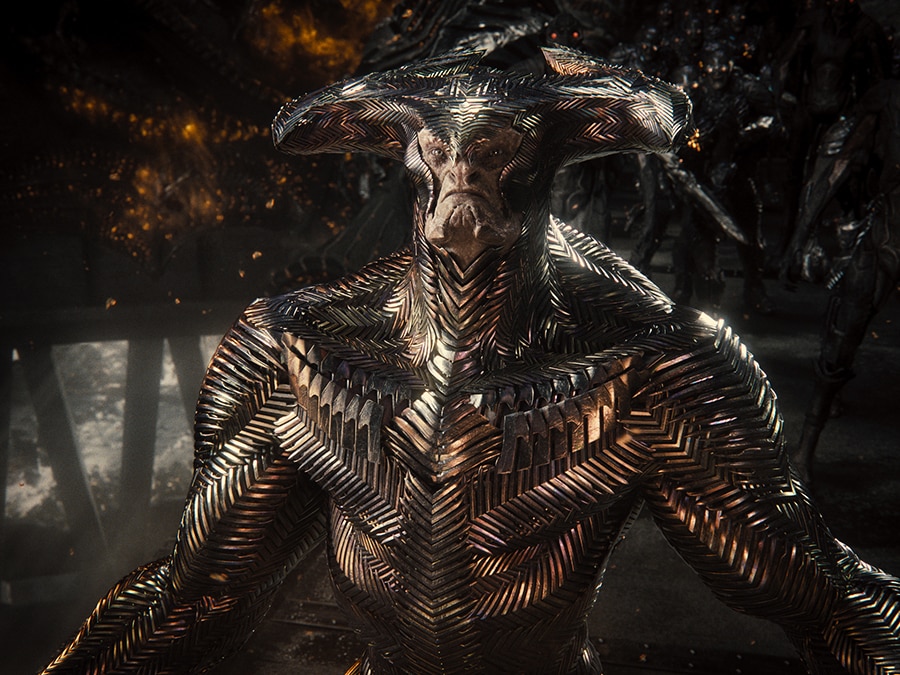
This movie is both bigger and more cosmic that the last DC movie you worked on. How did that impact the score?
Well, for starters, that also means that the pressure is more, right? I mean, these are very highly celebrated characters and a bunch of them actually appear for the first time on the big screen, like Cyborg, Steppenwolf, Darkseid, the Martian Manhunter, the Flash… And it's the first time, obviously, the League is together. So that definitely impacted the score in a way that I needed more themes. I needed more colors for all the different characters, as well as a distinctive theme for the group together.
Expanding on that a bit, some of the Justice League heroes, like Wonder Woman and Superman, have existing themes that are pretty popular, but others, like the characters you mentioned, are new and don’t. Did you write themes for the new ones or did you focus more on scoring them all as a team?
Yes, everybody has their own theme. The League is very important. For Wonder Woman, I took the idea that Hans (Zimmer) and I worked on together for Batman v Superman, but then made a new version of it where world music is more important—where I underscore the rich history of the Amazons and that they've been here for such a long time, and that they will always be here. I used ethnic instruments for that. The most apparent instrument, if you will, is the voice of Delaram Kamareh. This talented Persian opera singer is from Tehran, Iran, and she is the soulful inner voice of Wonder Woman.
Superman’s theme was developed by Hans for Man of Steel, and we used it in Batman v Superman. In the few spots that it plays in this movie, it's like a callback to the world of the last couple of movies. Batman is completely new in this movie, because Batman v Superman was focusing on Batman as a tormented character, with the traumatizing events that he experienced in his youth and how it's impacting him now. But that book is closed in Justice League. This is a new day for Batman, where he is on a different mission.

Zack Snyder’s Justice League also is the first time Darkseid has appeared in live action. How do you approach scoring such a powerful, larger than life character?
Well, it has a very larger than life sound. For Darkseid, the inspiration was more classical music than anything else. It has strong influences from things at the turn of the century from the 1900s into the 20th Century. So 1870, 1880 until around 1920. There’s a very rich orchestral music history in those forty years and I use a lot of those techniques for Darkseid to give him that character of he was always here and he probably will always be. It’s a complex harmonic structure combined with another influence from classical music—the choir pieces that composers like Henryk Gorecki and Arvo Pärt wrote. We have these voices that really start drifting and then can get really high in dynamics to create an almost God-like quality from hell, if you will. It’s very scary. So, Darkseid’s sound is rooted in a rich quality of orchestral music.
The first song released from the score, “The Crew at Warpower,” gives a good taste of what we can expect from the score as a whole. It’s both heroic and deeply rhythmic. What can you tell us about this song’s place in the film?
Well, “The Crew at Warpower” pretty much says what it is. It's the crew at their best and they're working together—they benefit from each other's strengths. It happens in a spot in the movie where they clearly have the upper hand. The rhythmic nature really underscores the action part of it and the thematic part really underscores there's no turning back now, or no turning to something potentially harmful. They have the upper hand and they're riding this out.
Another song that really stands out to me, from earlier in the film, is “And What Rough Beast.” One listen to that one and I felt like I could take on an army! Was that one just a blast to compose? It feels like it must have been.
That’s from the bank heist scene! Okay, so that is a scene where there's a clear and present danger. It’s part of the backstory for Wonder Woman. She's in solo action during that scene, kicking some serious ass. And yes, it was fun to compose. Absolutely.
Are there any superhero scores that you find particularly influential, or that you consider yourself a fan of?
Definitely Max Steiner, King Kong from '33. Not only was it highly influential, but I'm a massive fan of that use of music and the way that it was done. It was a game changer for me.
Which Justice Leaguer do you imagine has the best taste in music?
I would think the Flash. He's very nerdy. He's very intelligent. He's high-tech. Usually those people in general have exquisite taste in music. Whether it's something like Radiohead, or it's the more experimental electronic stuff, or it's the smarter pop music or hip hop music. Those people always have a really, really interesting taste in music. So I'm betting all my money on the Flash.
Zack Snyder's Justice League is now available for streaming on HBO Max. Not yet a subscriber? Click here to sign up today!
Zack Snyder's Justice League: Original Motion Picture Soundtrack by Tom Holkenborg is now available for purchase or streaming from WaterTower Music.

